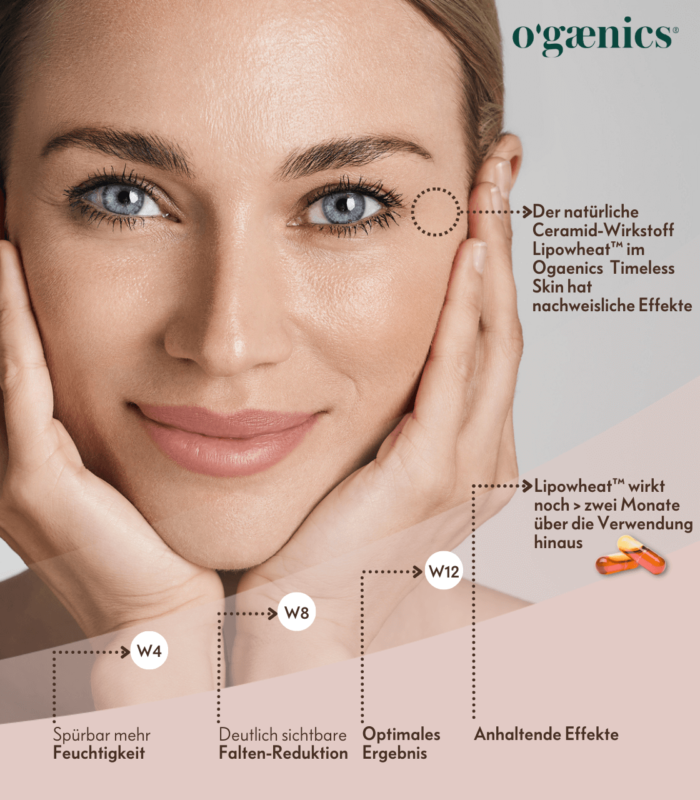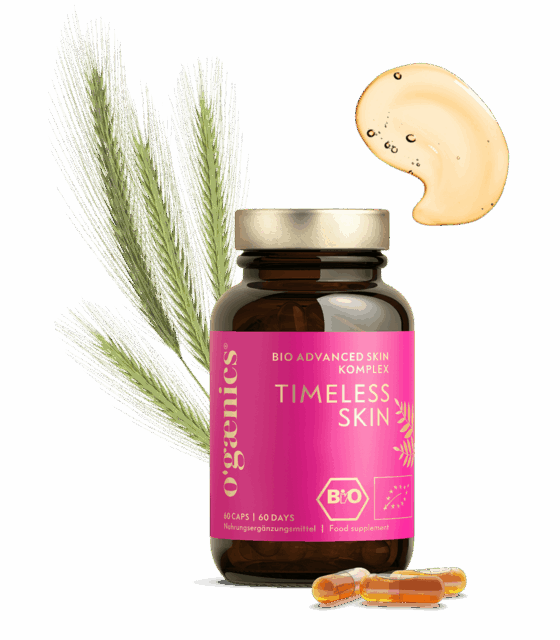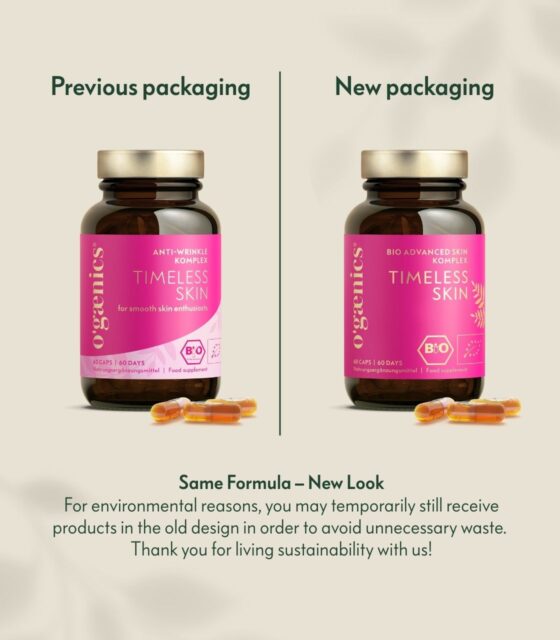IN THIS ARTICLE
01 What are ceramides
02 How does a ceramide deficiency manifest itself?
03 Which foods contain ceramides?
04 How do ceramides work as a dietary supplement?
05 How long does it take for ceramides to improve the skin as a dietary supplement?
06 Which is more effective? Dietary supplements or creams?
07 Conclusion
If your skin lacks glow and starts to show wrinkles, it could be due to a ceramide deficiency.
Are you in your 30s and noticing that your skin is increasingly losing elasticity and moisture? Feeling frustrated because no moisturizer or anti-aging products seem to help? Then you should definitely look into ceramides – the beauty elixir for your skin over 30.
What are ceramides?
Ceramides are natural lipids found in the outermost layer of the skin, the stratum corneum. They are essential for a healthy skin barrier and a youthful appearance. However, with age, the ceramide content in the skin decreases, which can lead to a weakened skin barrier, moisture loss and premature skin aging.
Ceramides are lipids or fats that naturally occur in high concentrations in the upper layers of the skin. They make up more than 40% of the skin’s composition and play a very important role in protecting the skin from environmental influences.
In the upper layer of the skin, ceramides are important for the barrier function of the skin. They act as a “glue” or “mortar” that binds the brick-like surface cells of the skin together and holds them together. This barrier is a protection against environmental toxins, bacteria and moisture loss….
But in addition, ceramides also have a stimulating effect on cell activity in the deeper layer of the skin and stimulate the production of proteins such as collagen and elastin, which are responsible for the firmness and elasticity of the skin.
This dual action protects the skin and makes ceramides so important for the healthy and youthful appearance of your skin.
How does a ceramide deficiency manifest itself?
Ceramide deficiency in the skin can be manifested by various symptoms. Here are some signs you should look out for:
- Dry and rough skin: An insufficient amount of ceramides can cause the skin to be unable to retain its moisture. This can cause the skin to become dry and rough.
- Itching and redness: A weakened skin barrier can allow irritants, allergens or bacteria to penetrate the skin more easily, resulting in itching and redness. There is even research that a ceramide deficiency may play a role in skin diseases such as rosacea.
- Sensitivity to external influences: A weakened skin barrier can also cause the skin to react more sensitively to external influences such as the sun, wind or cold.
- Premature skin aging: Ceramides are also responsible for skin regeneration and the production of collagen and elastin. A lack of ceramides can cause the skin to age faster, develop more wrinkles and lose elasticity.
If you notice some of these symptoms, you may have a ceramide deficiency. Taking supplements containing ceramides, such as Ogaenics Timeless Skin Complex, can then be helpful. Dryness, redness and irritation are reduced.
Which foods contain ceramides?
Ceramides occur naturally in many foods, especially plant sources such as whole grains, legumes, nuts and seeds, and animal products such as eggs, milk and meat.
However, it is important to note that the ceramide content in food is unfortunately not sufficient to achieve a desired effect on the skin. For this reason, there are supplements that specifically target the supply of ceramides, such as Timeless Skin Anti Wrinkle Complex with Ceramides.
How do ceramides work as a dietary supplement?
Ceramides as a dietary supplement can act on the skin in several ways. Here are some possible effects:
- Improving the skin barrier: Ceramides support the structure of the skin barrier and ensure that it can better retain moisture and protect against harmful environmental influences.
- Reduction of wrinkles: By strengthening the skin barrier and protecting it from environmental damage, the use of ceramides can help reduce the appearance of wrinkles and fine lines.
- Support collagen formation: Ceramides can also promote the production of collagen, which is important for the elasticity and firmness of the skin.
- Soothing irritated skin: People with sensitive skin or certain skin conditions such as rosacea may benefit from taking ceramides as they have soothing and anti-inflammatory properties.
- Wound healing support: Ceramides can also promote wound healing by stimulating cell regeneration and strengthening the skin barrier.
Overall, ceramides as a dietary supplement can help improve the health and appearance of the skin by supporting its natural protective and repair mechanisms.
Options for natural skin care from the inside
In addition to ceramides, hyaluronic acid also plays a decisive role in skin hydration and elasticity. While ceramides strengthen the skin barrier and reduce moisture loss, hyaluronic acid ensures that the skin is deeply hydrated from within.
👉 Read more here about how hyaluronic acid improves skin hydration and smoothes the first wrinkles: Hyaluronic acid capsules: what they can really do
💡 Pro tip: The combination of ceramides and hyaluronic acid has been shown in studies to provide the skin with optimal moisture and at the same time protect it from external influences. Supplementing with both active ingredients can therefore be particularly effective for radiant, plump skin.
Oxidative stress and cell protection
In addition to a ceramide deficiency, oxidative stress caused by environmental influences such as UV radiation, air pollution or an unbalanced diet can contribute to skin ageing. Antioxidants help to neutralize these free radicals. This is where Cellular Life from Ogaenics supports the antioxidant system and protects the cells from oxidative stress. While Timeless Skin specifically replenishes ceramides, Cellular Life Cellular Life ensures that the cells remain healthy and counteracts premature skin ageing. A super combination.
How long does it take for ceramides to improve the skin?
The time it takes to see improvement in the skin after taking ceramides as a dietary supplement may vary from person to person. It depends, for example, on the severity of the ceramide deficiency, the age of the person and their general health.
However, studies have shown that continuous intake of ceramides over a period of up to 12 weeks is required to achieve visible improvement. However, initial, visible results have already been demonstrated in studies after four weeks. The full effect of orally ingested ceramides, on the other hand, unfolds over a period of 4-12 weeks.
However, it is important to note that taking ceramides alone is not enough to maintain healthy skin. A healthy lifestyle, sufficient sleep, a balanced diet and protection from UV rays are also important factors for healthy skin.
Which is better: ceramides as a dietary supplement or cream?
Both the intake of ceramides as dietary supplements and the use of creams containing ceramides can help to improve the ceramide balance of the skin.
However, ceramides taken from within can have a deeper effect on the skin, as they can strengthen the skin barrier from within and stimulate ceramide production in skin cells. Creams containing ceramides, on the other hand, have a more superficial effect and can help to bind moisture in the skin and protect the skin barrier.
Conclusion
Ceramides are lipids (fats) that occur naturally in the skin. They have an important role in protecting the skin from damage caused by environmental stimuli and maintain the youthful radiance of the skin.
When we age or our skin is already damaged (e.g. by the sun), the ceramide content of the skin decreases. This can lead to dry, rough skin, as well as wrinkles, redness and irritation.
Externally supplied ceramides can compensate for this and help the skin look younger, retain more moisture and be firm and supple. The supplementation achieves significantly better results than cosmetic products with ceramides.









 No products in the cart.
No products in the cart.